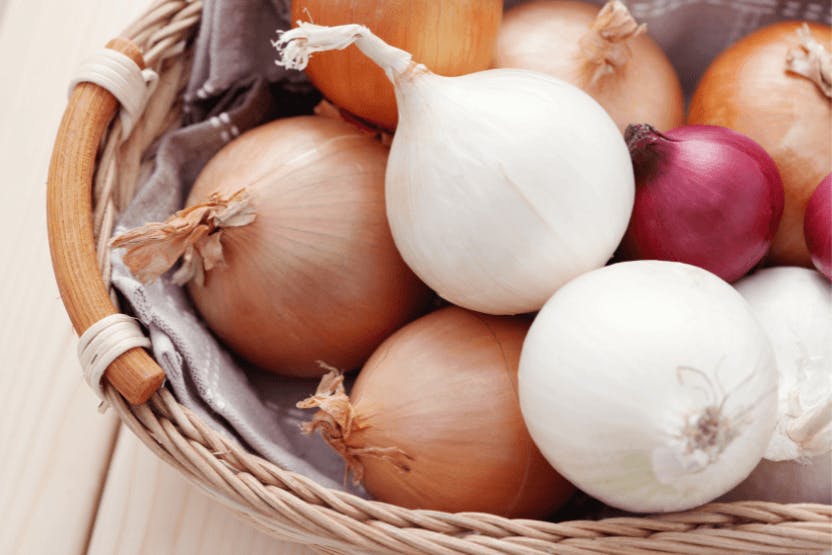
By Wag! Staff
Published: 03/13/2023, edited: 03/12/2024
Reviewed by a licensed veterinary professional: Dr. Linda Simon, MVB MRCVS
More articles by Wag! Staff
Save on pet insurance for your pet
You don't have to choose between your pet and your wallet when it comes to expensive vet visits. Prepare ahead of time for unexpected vet bills by finding the pawfect pet insurance.
There are some ingredients that are fine for humans to eat, but potentially poisonous for dogs. Onions, along with other members of the allium family — among them garlic, shallots, leeks and chives — can be potentially fatal if eaten in large enough quantities.
Sure, dogs are unlikely to be desperate to eat raw onion, but they’ll more than happily gobble up human food that contains the ingredient in cooked or powdered form.
Read Wag!’s guide to learn more on this and life-saving advice on what to do if your dog eats onions. You’ll discover, that:
- Onions are toxic to dogs and consumption can lead to Hemolytic Anemia, a potentially fatal condition
- This isn’t just raw onions, however — the answer to ‘can dogs eat cooked onions?’ is still no, just as it is for powdered, sauteed and steamed onions
- Potential symptoms of onion poisoning include lethargy, diarrhea and vomiting
- Parents should seek immediate veterinary attention if they suspect their dog has eaten onions
Why Can’t Dogs Eat Onions?
Onions contain a compound called thiosulphate, which is incredibly toxic to dogs as well as cats. Eating onions puts them at risk of experiencing Hemolytic Anemia, a very painful and potentially fatal condition.
Hemolytic Anemia causes a dog’s immune system to target healthy red blood cells and start killing them off. This lowered count can lead to a reduction in oxygen being transported around the body and a whole host of nasty symptoms.
They can take around 3 to 5 days to appear and include:
Can Dogs Eat Onion Rings?
No, dogs can’t eat onion rings. As well as containing onions, they’re usually fried and high in fat. Too much fat in a dog’s diet can potentially lead to obesity and a range of other linked conditions, such as diabetes or pancreatitis.
Can Dogs Eat Onion Powder?
Parents shouldn’t give their dog any food that contains onion powder. In fact, this could prove to be even more toxic than fresh onions as it’s a concentrate.
Be sure to clean up any spills straight away if you’re using onion powder in the kitchen and store it well out of reach of dogs.
What Should I Do If My Dog Eats Onions?
If your dog exhibits any of the aforementioned symptoms and you have reason to suspect it might be linked to onion consumption, you should seek urgent veterinary attention.
Treatment normally involves the inducement of vomiting, flushing out the tummy and using activated charcoal to prevent toxicity. Your vet might also decide to maintain hydration by providing fluid to the dog’s bloodstream, provide medication for liver damage, and even perform blood transfusions in more serious cases.
Parents shouldn’t attempt to treat a case of onion poisoning by themselves. In certain cases, inducing vomiting can cause more harm than good, so it's best to seek veterinary attention.
How Much Onion Is Toxic To Dogs?
There are a number of factors that determine how your dog will be affected by onions, such as the size of the dog in question and the amount of onion eaten.
As a rule of thumb, a toxic dose is considered to be more than 0.5% of a dog's body weight. This means it only takes 100 grams of onion (about the size of a medium onion) per 20 kilograms of a dog’s weight to cause toxic effects. A 45-pound dog would only have to eat one medium-to-large onion to potentially experience onion poisoning.
As well as a large amount eaten in one sitting, a smaller amount of onion can still prove dangerous to a dog’s body if it’s eaten regularly over a long period of time.
Can Dogs Eat Onions in Tiny Amounts?
Onions are one of the most dangerous human foods out there for our canine companions, so even if your dog ate a tiny slice, you should monitor them for symptoms.
There’s a chance that a small amount won't produce harmful side effects depending on the size of your dog, but parents should always consult their vet or the Pet Poison Helpline of (888) 426-4435 if they catch their dog eating onions.
Why Does Some Dog Food Contain Onion?
Given that it’s poisonous to dogs, you would think that it would be a given for pet food manufacturers to not use it as an ingredient in their recipes. However, you might spot it lurking towards the bottom of the ingredient list, often as ‘onion extract’.
This is likely to be a microscopic amount of onion that falls well short of the toxic amount. However, we’d still consider steering well clear of dog food that contains onions in any quantity and it’s a timely reminder that you should always closely read any dog food label before buying a brand.
For the best canine meals that are free from onion, head to our partner Dog Food Advisor for the very best options
A pet insurance policy really comes into its own during urgent situations, such as suspected onion poisoning — use Wag!’s online comparison tool to find the right deal for you and your dog
You may also like
